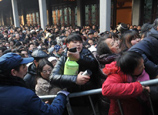
Ji says that expensive cars are normally redeemed within a week. Cars that have not been redeemed for more than a month are often sold at low prices in the center to local buyers.
The burgeoning demand for car pawn services has also triggered more problems for pawnshop owners due to the higher default risks.
When the redemption period passes, the goods often end up as "dead pawns", meaning the pawnshop has the right to sell them at a low price.
"Most of the owners redeem their cars on time before the redemption period ends, but if they fail to repay the interest and the amount of borrowed money, we have to sell the cars for cash," said Ye Zhitong, the manager of a Beijing-based pawnshop.
Ye added that it is not easy to sell the cars to second-hand buyers due to the stiff restrictions on purchase of personal cars in Beijing.
The run-up to the forthcoming Chinese New Year has been overwhelming for most of the pawnshops in China as the tight loan policies for SMEs have severely dented prospects for several businesses.
Non-performing loans at the 16 listed banks in China have exceeded 387 billion yuan, 18 billion yuan more than the beginning of the year, payment service provider China UnionPay Co said in a recent report.
With most of the banks looking to trim their lending risks by limiting the loans to small- and medium-sized businesses, it has been the small-loan companies that have actually benefited, the report said.
According to data published by the China Microfinance Institution Association, the more than 6,000 small-loan companies in China had by the end of 2012 disbursed loans worth more than 600 billion yuan, 52 percent higher than the previous year.
Last year, 26 small-loan companies were authorized, while 31 new companies opened their doors for business in Wenzhou, Zhejiang province.
"The targeted customers of these companies are mostly owners of local SMEs, who have failed to meet the requirements set by financial lenders," said Zhuang Zhonghua, the general manager of Wenzhou Yizhao Small-Sum Loan Corp Ltd, which was launched in March 2010 with a registered capital of 200 million yuan.
Of the 400,000 privately owned enterprises in Wenzhou, nearly 30 percent are not qualified to seek financial assistance from State-owned banks and hence need to borrow money from loan companies.
"Properties and personal belongings such as cars are also accepted as collateral for short-term loans especially during the year-ending period, when cash becomes really tight," said Zhuang.
The registered capital of Wenzhou Yizhao Small-Sum Loan Corp Ltd, comprising of 12 shareholders was increased to 400 million yuan in 2011.
The total amount of money available for loan lending in the company is 500 million yuan including 1 million yuan loan from a financial institution. The maximum amount of loans that an individual can avail from the firm is 1 million yuan with a monthly interest rate of 1.7 percent, about three times higher than the interest rate charged by State-owned banks.
"We want to help small- and micro-enterprises with more accessible loans. But we also have to control risks and so we have to increase the interest rate," said Zhuang.
yuran@chinadaily.com.cn

















 'Collective children's weddings' held in kindergarten
'Collective children's weddings' held in kindergarten


![]()
